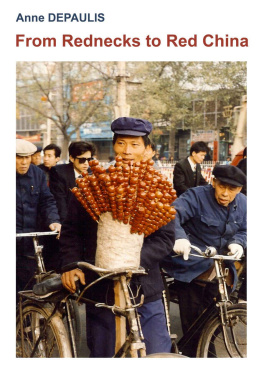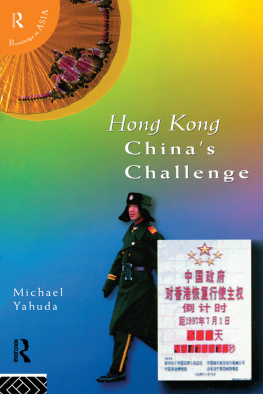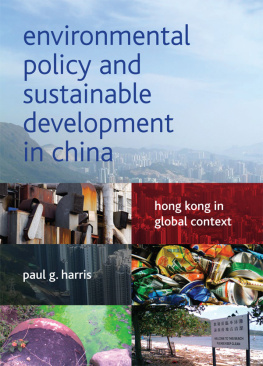TABLE OF CONTENTS
PREFACE
FROM REDNECKS TO RED CHINA is a collection of anecdotes related to my stay in Beijing, in 1986, as a student of Mandarin. I started writing in the early 2000s, while living in Hong Kong, aware that China was rapidly changing. The country I knew might disappear forever. Added motivation came from joining a writing group whose comments and suggestions proved invaluable.
Nearly fifteen years later, after reworking the stories on a few occasions, I sent a few of them to a young Chinese woman met in Paris. To my great surprise, she enjoyed them and asked for more. This is a side of China I dont know, she wrote back. That eventually prompted me to take advantage of todays self-publishing facilities, since my dealings with potential publishers were unsuccessful. Next year, it will be 30 years since I was a student in China and changes are beyond what I ever imagined.
When I arrived in Beijing, in 1986, I was reasonably well prepared for a new intercultural experience. I had studied the language, during my university days, although, by then, it was nearly all forgotten. However, the best preparation for my stay in China was, again, that year in Texas, at the age of seventeen. As tough as it was, that experience had made me extremely adaptable and helped me make adjustments in my life in Beijing.
It is hard, if not impossible, to quantify what we gain out of intercultural experiences. However, when I look back over the years, coming to grips with foreign cultures has been the most valuable part of my life. It definitely helped me with my professional life and, on the personal level, it has meant rich encounters with wonderful people. Other cultures are a source of inspiration and open the mind. The Chinese are amazingly adaptable, resilient and move forward rather than indulge in self-pity. I do my best to be Chinese at times. Their sense of hospitality is beyond what I have experienced, anywhere else in the world, and I try to remember that too. The recipe for intercultural success, not always an easy task, is a fine balance between absorbing a new culture, keeping your own and respect differences.
Why the use of English? My life in Beijing, in 1986, was either in Chinese or English but not in French. When I started writing in Hong Kong, English was the dominant language and, besides, I knew I could reach more people that way. Honni soit qui mal y pense!
Anne Depaulis
Paris, February 2015
Warmest thanks to Bruce, Dsire, Ellen, Harry, Lavinia, Leela, Liang, Marianne, Nora, and Vivian for their precious comments and suggestions over the years.
Graphic Designer: Vronique Lassablire

Translation of the Chinese characters: We like peace (photo A.D.)
DESTINATION BEIJING
I flew to China for the first time, in 1986, to be a student of Mandarin for six months in Beijing. The cheapest flight I could find was with TAROM, the flag carrier of Romania, and the journey from London took a long thirty-six hours. It was a cold and miserable day, in late February, and the first leg of the trip was with an old and creaking Tupolev. A tall strong-looking steward kicked the door shut and off we went for the most frightening flight ever. We went up and down, like a yoyo, for about three hours but, fortunately, boarded a larger plane in Bucharest. Before our final destination, we stopped in Karachi for a couple of hours. There was just enough time for a hot cup of tea, the local style, with a strong taste of ginger and cardamom.
Many hours later, I walked through the deserted airport of Beijing, holding my breath. There was suddenly a feeling of time warp as everything looked bare and desolate. I walked under a large banner; Welcome to Beijing International, it said in Chinese. I felt proud I could read as much as that. I had studied Chinese in France, in the mid 70s, but it was long forgotten for lack of practice I went through Immigration in record time, and then proceeded to the luggage section to find my suitcase already there. Shortly afterwards, a good-looking man walked towards me and introduced himself as Mr. Wang. I am here on behalf of our college. Welcome to Beijing, Miss Anne, he said in a rehearsed manner. Within no time, I was whisked away in a white Shanghai, just like the car I remembered from The Blue Lotus (The Adventures of Tintin).
The trip from the airport to my college took about an hour. The Beijing Teachers Training College was located in the north-western part of the capital, home to a lot of universities. It was quite late in the day and staff at the reception immediately took me to my room, Spartan to say the least. The floor was bare concrete, the bed extremely hard and the only piece of furniture was a shoddy-looking table. Communication proved difficult, as my Chinese was incredibly rusty and non-existent regarding daily life. I quickly discovered that Classical Chinese does not help much when your shower is not working.
A young American with yellow hair huang toufa came to my rescue and explained the situation. Things often break down here, so youd better learn the word huai le , its broken in Chinese.
My new friend, John, added with a broad smile: Youll find the conversation often goes like this Zenme ban?, the equivalent of What shall we do?. Then the Chinese will tell you with a shrug Meiyou banfa Nothing can be done.
FROM REDNECKS TO RED CHINA
In the early 70s, I was the odd one to study Chinese in France. In those days, what inspired me, besides Pearl Bucks novels and The Blue Lotus, was the challenge of a difficult language. I quickly became fascinated with Chinese characters and, most of all, I liked my classmates, a small group of fun and interesting people. Among our teachers, one had lived in China in the early 60s and our Department Head, a Frenchman born in Japan, was a prominent Sinologist. Another had to leave China in the middle of the Cultural Revolution, in the late 60s, when things got rough. He was banned from playing the piano, a decadent pastime during that period, and hadnt quite recovered from the difficult time he had. I was by far the youngest but this eclectic crowd quickly adopted me.
The Cultural Revolution was then in full swing and our study books, printed in Beijing, were full of political jargon. To this day, I have not forgotten useful phrases such as We must follow the path of Marxism Leninism... and Long live Chairman Mao For three years, I learned political vocabulary and Classical Chinese but never learned how to say, My shower is broken, can you please fix it?
One of the highlights of my university days was an extra curriculum activity initiated by one of our teachers. Under Madame Gauthiers supervision, a few of us started translating Family by the famous writer Ba Jin. The novel is about the disintegration of a Chinese family with old-fashioned values and gives a detailed account of everyday life in the early 1900s. I can still hear the shuffling of mah-jong tiles the twittering of sparrows, as they say in Chinese - and the bickering of idle women. We all enjoyed working on the translation of Family and, every time we finished a chapter, our teacher baked a cake to celebrate. Unfortunately, before we knew it, somebody else had published the French translation. This is how I found out that life is not always a piece of cake
During that period at university, I went through a series of culture shocks and one of them was readjusting to France as well as learning Chinese. I had just come back from living with an American family in Texas as an exchange student with AFS. My time in Dallas was about learning another language and coping with cultural differences. Many people I met were conservative to an extreme, sometimes described as rednecks by other Americans, and yet could be warm and hospitable to an extreme as well.










